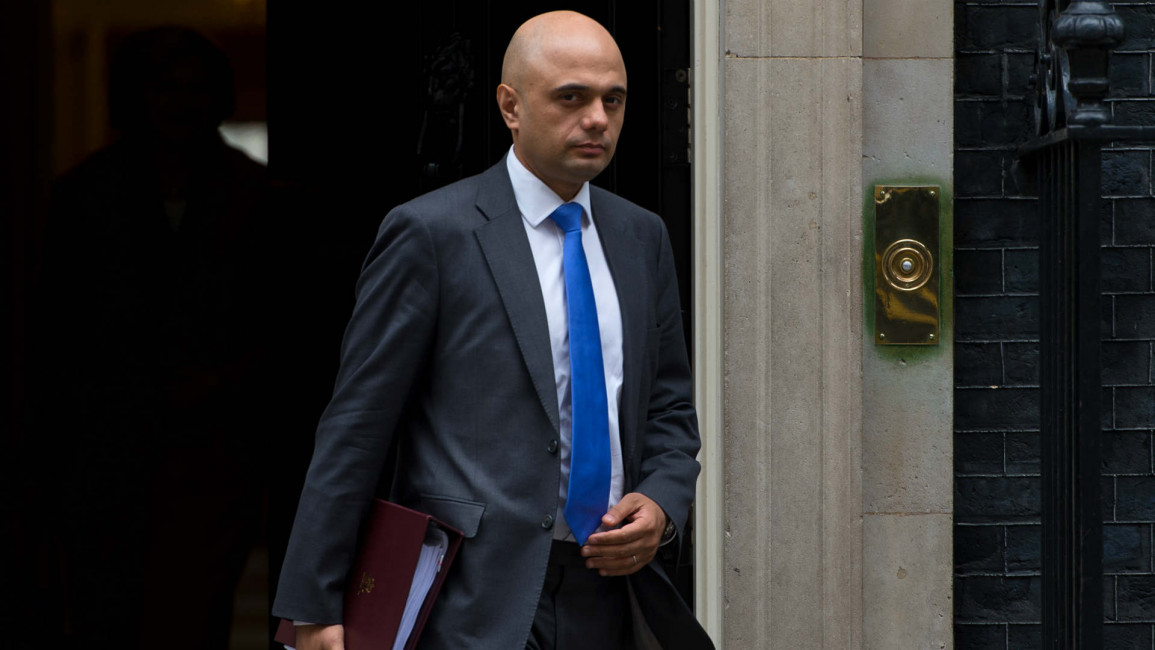
UK government's moves to outlaw BDS are unethical
The UK's Secretary of State for Communities has revealed fresh moves to stop local councils boycotting companies that profit from Israel's crimes.
Sajid Javid, head of the Department for Communities and Local Government, announced last Monday that he wants to make boycott and divestment initiatives by local authorities illegal unless they are consistent with central government policy.
The move is potentially a step up in the UK government's war on the Boycott Divestment and Sanctions (BDS) movement.
In October 2015, the government introduced new regulations making it very difficult for councils to use their pension funds to pursue ethical divestment policies. The rules - which came into force in November 2016 - give the government the power to veto local investment decisions made on ethical grounds.
Then, in February last year, this was followed by the Cabinet Office issuing guidelines intended to discourage procurement boycotts (in other words, the exclusion of certain companies - complicit in violations of international law - from bidding for public contracts).
This counter-attack followed years of grassroots local government activism by Palestinian solidarity activists which contributed to French multinational water and waste management firm Veolia losing billions of pounds worth of contracts in the UK.
 |
In reality, the government is seeking to help companies evade corporate social responsibility |  |
Importantly, legal experts suggested that the Cabinet Office guidelines on procurement boycotts in fact contained nothing that was really new - suggesting that the move was merely an intimidation tactic.
However, now Javid - a longstanding member of Conservative Friends of Israel - plans to try to legally block any "unfair" treatment of countries or corporations that deviates from government policy.
The right-wing press have presented the announcement as part of a "crackdown on anti-Semitism". Anti-Semitic motives have long been insinuated by Javid, who characterises local boycotts as undermining "good community relations" and falsely claims that prior boycotts have involved calls for Jewish films to be banned.
In reality, the government is seeking to help companies evade corporate social responsibility. If followed through, it could prevent local councils being held accountable for how they use public money.
While the announcement is being reported as if it will inevitably pass into law, at present the policy is only at consultation stage.
 |
The Conservative UK government wants to maintain close relations with Israel after Brexit |  |
But despite the likelihood of widespread public opposition, the government's track record suggests it will implement the measures regardless. It pushed ahead with the pensions veto despite 98 percent opposition at consultation and harsh criticism from local councillors (though this may still be subject to a legal challenge).
In addition, Javid - who is sometimes tipped as a future prime minister - has a personal history of undemocratically imposing his own will against the wishes of local authorities and civil society, including independent arts organisations, where Israel is concerned and on other controversial issues such as fracking.
| Read more: Israel set to ban entry to BDS supporters | |
His agenda echoes condemnation of the BDS movement from numerous other senior British politicians and may be partly about ingratiating himself with pro-Israel lobbyists in the UK.
One such group, the explicitly anti-BDS Jewish Human Rights Watch took three local councils to court over their positions on Israel/Palestine and settlement goods - but the case was dismissed by the High Court.
Figures linked to Conservative Friends of Israel are believed to make considerable donations to the election campaigns of preferred candidates.
As well as this, the Conservative UK government wants to maintain close relations with Israel after Brexit. During Israeli Prime Minister Benjamin Netanyahu's recent UK visit, a UK-Israel Trade Working Group was announced by British Prime Minister Theresa May.
 |
In return for clamping down on BDS, UK ministers may be hoping to benefit from Israel's hi-tech, cyber-security and defence expertise |  |
The UK's Minister for Trade Policy, Lord Price, is set to visit Israel soon to assess how to implement a preferential bilateral free trade deal with Israel after the UK's departure from the European Union (when the current Association Agreement between Israel and the EU will cease to apply).
The new anti-boycott moves may also be interpreted as a quid pro quo. In return for clamping down on BDS as requested by the Israeli government, UK ministers may be hoping to benefit from Israel's hi-tech, cyber-security and defence expertise to ensure the strength of the economy in post-Brexit Britain.
As such, the move confirms prior indications - such as the sale of £100m worth of fighter jets to Turkey despite major human rights concerns - that the self-isolation of Brexit will be accompanied by a complete abrogation of ethical considerations in UK foreign policy.
Hilary Aked is an analyst and researcher whose PhD studies focus on the influence of the Israel lobby in the United Kingdom.
Follow her on Twitter: @Hilary_Aked
Opinions expressed in this article remain those of the author and do not necessarily represent those of The New Arab, its editorial board or staff.



